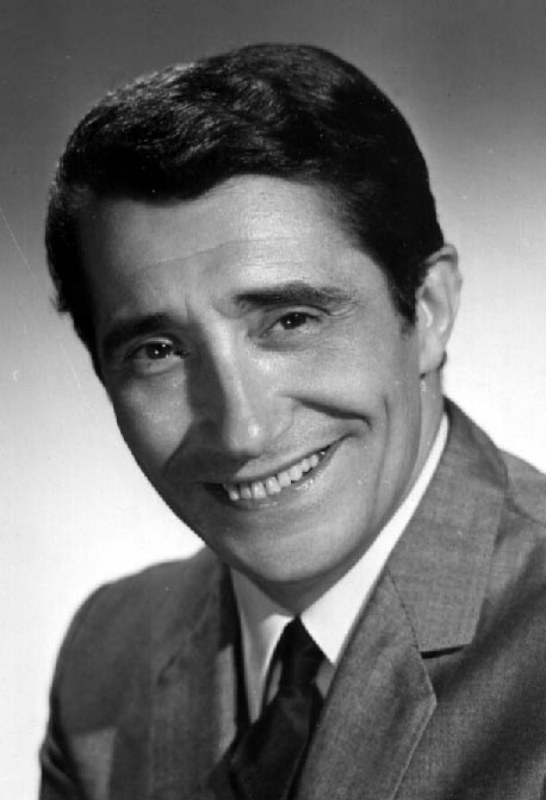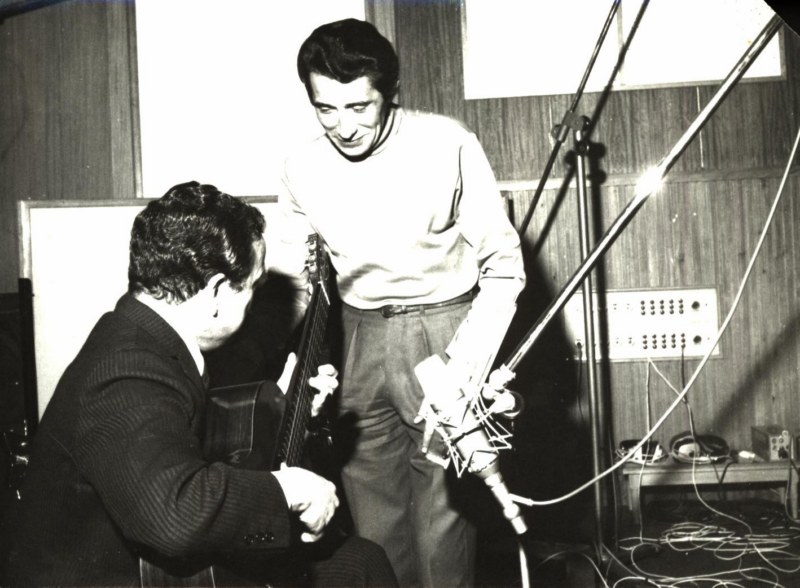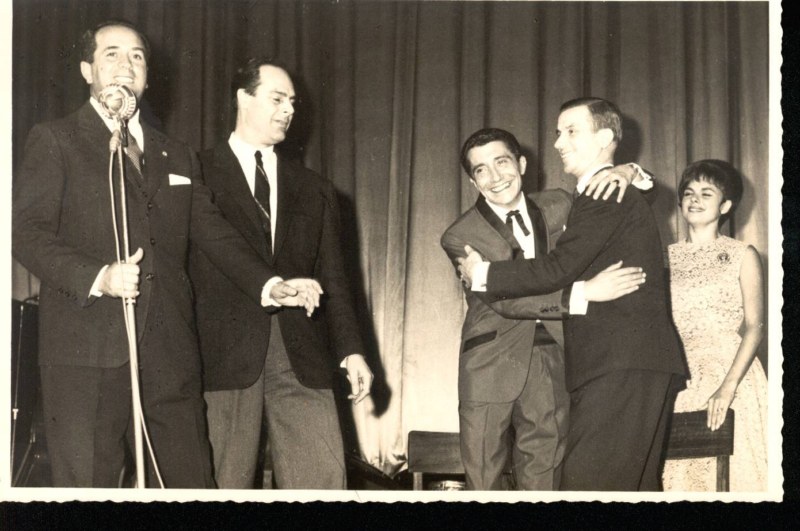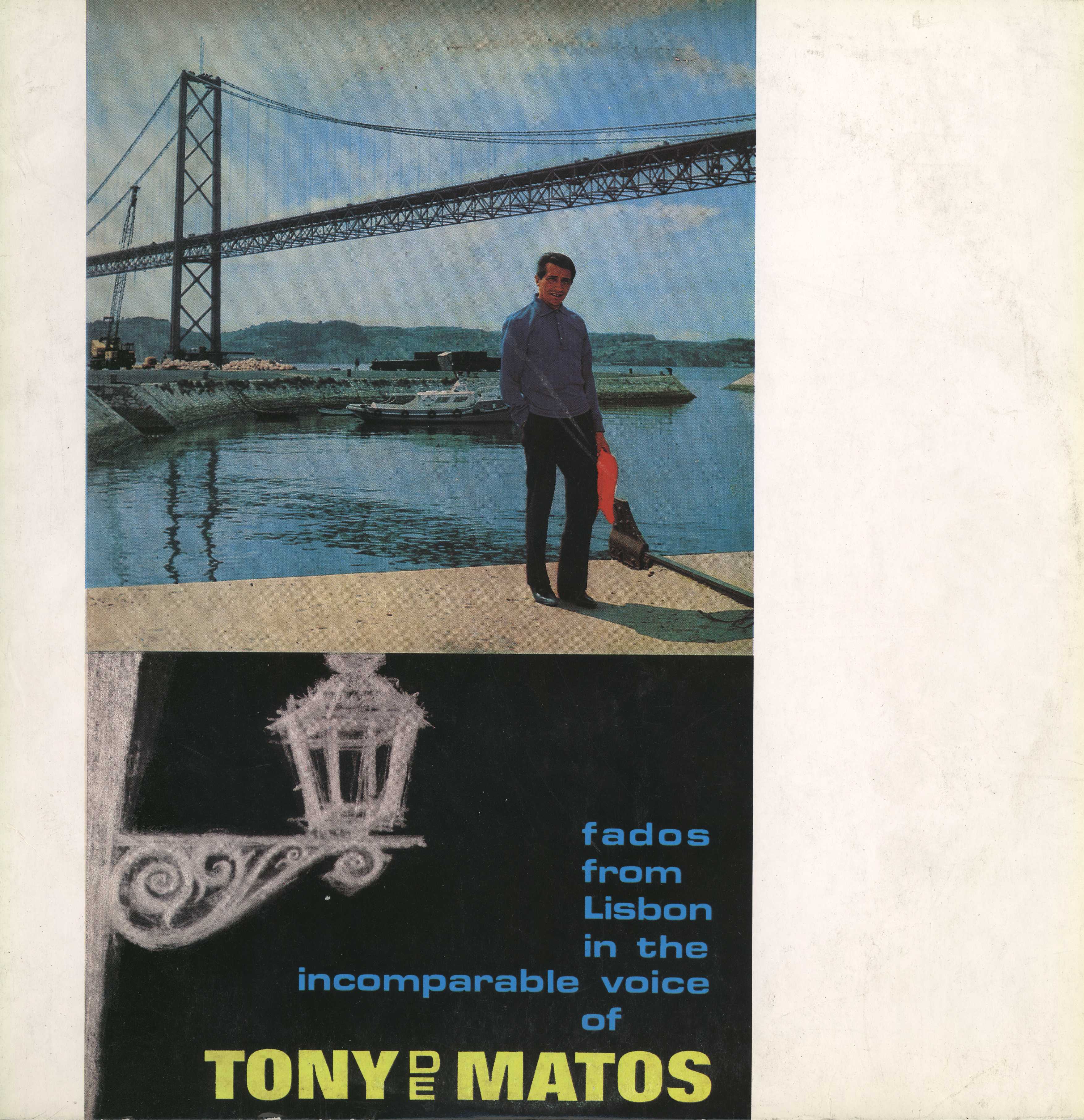Know more:
Tony de Matos
(N. 28 October, 1924 - M. 8 June, 1989)António Maria de Matos, who became one of the most charismatic figures in the Portuguese artistic scene, was born in Porto, on the 28 October 1924. Son of Afonso de Matos and Mila Graça, he spent his first years at his birth city, until he joined the touring Theatre Company of Rafael de Oliveira, accompanying his mother. Tony, so everyone called him, soon started to deal with stages having spent part of his childhood and adolescence travelling from town to town. He worked as a prompter, at 13 years old, and learned the barber trade in the places visited by the company.
His desire to sing makes him go to Lisbon, but he ends up working at Comissão Reguladora das Moagens de Ramas. In 1945 he debuts behind the microphones at Emissora Nacional. Returning to the Theatre Company, at an exhibition in one of the many night feasts, in this case at the Atlético, Tony sang and marvelled. Júlio Peres listens to him and invites him to join him at Café Lisboa and Luso, where he performs again, being immediately hired to the house’s cast. Tony de Matos was 23 years old at the time we became a professional, earning 50 escudos a night, a significant change in his course, since “until then I only sang in serenades by the boys to the local girls…” Tony de Matos begins in a "truly fado singing environment".
After he was approved at the contests organized by Emissora Nacional, he joins the APA (Agência de Publicidade Artística), and the "Comboio das Seis e Meia", travelling around the country in countless shows which give him an increasing popularity, particularly with romantic songs, which mark his entire artistic pathway.
In the beginning of the 1950s, Tony de Matos is invited by Manuel Simões to record his first record, in Madrid, revealing the theme "Cartas de Amor" as an enormous success. The divulgation of this and other themes is made by the Portuguese radio and the name Tony de Matos reaches such popularity that, upon his return to Portugal, he is invited to film the documentary "Almourol", by Fernando Garcia. The singer also debuts in the vaudeville theatre, with the cast of "Cantigas Ó Rosa", followed by "Saias Curtas", both in 1953.
By the end of 1953, and thanks to his success, the entrepreneur Mangioni invites him to spend a season in Brazil. He is immediately hired for shows at the best houses; "Oásis", "Lord" and "Esplanada", as well as TV and radio shows. During this six months period in Brazil Tony de Matos records again, revealing a new hit; "Rosinha dos Limões". He does not have many memories of his return to Lisbon since he went back to Brazil a month after, aboard the "Santa Maria", and visited Rio de Janeiro and Santos. Tony de Matos reveals in an interview: "I have plenty of contracts, fortunately. The audience at Brazil has cherished me in such a way that I feel at home whether at Rio or São Paulo!".
Tony de Matos marked an era and was invited for shows and tours all over the world, from the Azores to Madeira, Spain, Italy, São Tomé, Angola, Mozambique, South Africa, former Belgian Congo, Rhodesia, Goa, Lebanon, Iraq, Egypt, Turkey, and many others.
After visiting many continents, he returns to Brazil in 1957, already married to the singer Maria Sidónio, with whom he opens the restaurant "Fado" in Copacabana (1959), in the wake of an increasing success. Tony de Matos continues making radio and TV shows in Brazil, namely in TV Rio, TV Tupi, Rádio Nacional and Clube 36. He travels all over the country, gathering applause and successful records, with help from Joaquim Pimental and António Rodrigues, who wrote him, among other themes, "Vendaval", one of his greatest hits, quickly divulged by radio and TV.
He returns to Portugal after spending 3 years in Brazil, bringing: "a good pair of future hits, recorded in 3 LP´s, 36 songs and 3 others in 45 RPM. These included, for example: "Lugar vazio", "Lado a Lado", "Procuro mas não te encontro", "Poema do fim", "Vendaval". Upon his return he dreams of opening a restaurant similar to the one he had in Brazil ("Fados"), and maintains his success level, extending to romantic songs, now with Valentim de Carvalho, with which he signs up.
He opens the restaurant "Lado-a-Lado", increasing his popularity, and in 1964 he debuts in the movie "A Canção da Saudade" (1964), by Henrique Campos, where he sings "Só nós dois". On the 3 April de 1965, Tony de Matos receives the Light Music Award for best interpreter; this same year he returns to movies, participating in "Rapazes de Táxis", by Constantino Esteves.
Tony de Matos competes in the RTP Song Festival (1966), performing the theme "Nada e Ninguém", with lyrics by António José, getting last place. In 1968 he returns to theatre, joining the cast of the vaudeville play "Arroz de Miúdas", where he created "O Que Sobrou da Mouraria", with lyrics by Paulo da Fonseca, César de Oliveira and Rogério Bracinha and music by João Nobre.
Due to his interpretations, Tony de Matos becomes known as a romantic singer, the “romantic voice singer”, in the words of Natália Correia, becoming of the most prominent and popular voices in the song business; along with his sold records and all this fame, he continues working in movies, such as "O destino marca a hora" (1970), by Henrique Campos and "Derrapagem" (1974), by Constantino Esteves.
He begins a tour through the U.S.A., falls in love again and lives there for about 8 years.
The return to Portugal coincided with new experiences in vaudeville theatre, and he became one of the main stars in some plays. He starts a "serious, happy and lasting relationship with the fado singer Lídia Ribeiro, who stays by his side for the rest of his life. During the same period he shares the managing of the fado house "Fado Menor" with Carlos Zel and Filipe Duarte, visited by great names of fado.
In 1985, João Henriques writes him the song "Romântico", bringing him renewed fame and contracts, and the invitation by Vitorino to perform at show in Coliseu dos Recreios, where the audience surrendered to his talent.-It had such repercussion that in November 1985 Tony de Matos would return to the Coliseu’s stage for a last show which, for the joy of all the audience, revisited most of his hits.
Tony de Matos dies in 8 June de 1989, ending a successful career. He will always be remembered as the romantic singer who exalted love, with a characteristic voice made of a unique and inimitable timbre.
In 2006 RTP and Ovação release the DVD of his last concert and in 2007 the album "A vida de um romântico" is released, under the label Farol.
Tony de Matos passed away on June 8, 1989.
Source:
"A Voz de Portugal", 10 September 1954;
Revista "Flama", 16 March 1962;
Revista "Flama", 14 February 1964;
"Antena", 15 September 1967;
"A Capital", 24 September 1988;
Sucena, Eduardo (1992), "Lisboa, O Fado e os Fadistas", Lisboa, Veja

Tony de Matos, s/d.

Tony de Matos, Estúdios da Polysom, s/.

Igrejas Caeiro, Armando Marques Ferreira, Tony de Matos e Fernando Farinha Festa de Tony de Matos, Cinema Império, 1962
-
Vendaval Tony de Matos (Joaquim Pimentel / António Rodrigues)
